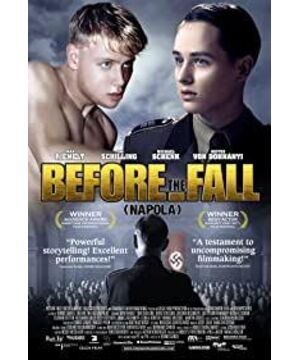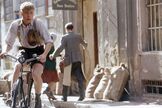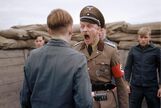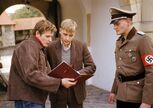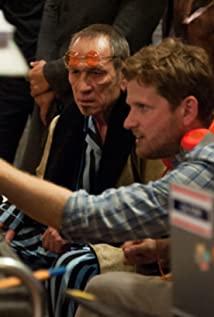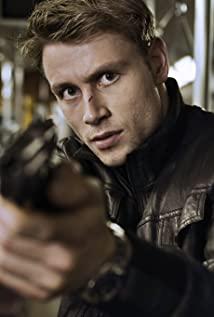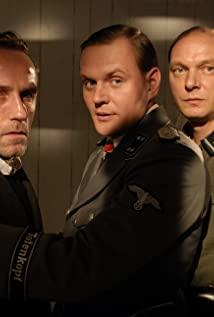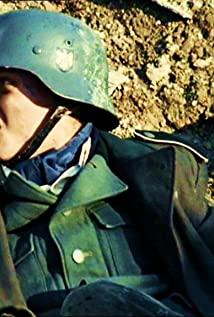The audience did not see any corners related to war, but it seemed to be more cruel than fierce blood.
You know, when the beautiful things are forcibly destroyed in front of your eyes, and you can only stand by, it is not only a tragedy, it is no longer a so-called "tragic beauty" that is viewed from a distance in history, but a sad , pity and inexplicable tears that have been clamored for a long time.
Man is the manifest existence of the spirit. When the spirit eliminated a group of perverts, the mutants were "wolf smoke everywhere". In "Hitler's Boy", the fascist who can be said to be a heterosexual state of mind under the sentence "Long live Hitler", is that people are extremely excited, and that 45-degree gesture is not "the interests of the German people are above everything else", but " You all! Listen to me!" It is yearning and high pressure on the people. Hitler's boy is the hormonal eruption at a time when the worldview is gradually being formed under that shout.
Friedrich is an ordinary boy, except for boxing, his life is just a few lines of normalcy. War may be just a distant term, and he has no way of knowing what is the real national interest and what is real life. Life is all going around and boxing. Until one day, his excellent boxing skills were valued by a coach, who hoped that he could enter the school to study, this militarized school gave many people a good fantasy. Step into it, then fame and fortune are your labels, and countless people say long live to you, no matter how short you are. Even though Friedrich's parents objected, he resolutely left quietly. Everyone wants to be a "wind" when they are young.
At this point in the film, his parents were the first to oppose it, but they simply prevented it from behavior and did not tell the reason. They may only know that war means death, and generations, as the people themselves, still hope for an ordinary life, and do not need any peaks, as long as their families are healthy.
The Hitler boy stepped into school while also working hard after school to rehearse boxing. What is the pain of the body, and what is it, victory is the paralysis needle. At that time, he was still hesitant about the punch to decide the outcome, but the coach told him, "either you die or he will die", there is only one victory, and prepare for the strong. At this time, he was still a grass, and his heart fluttered with the words of others.
During the match, his final punch was directly and violently catalyzed by cheers. His raised hand is like long live Hitler, humanity is being eroded little by little. The cheers drowned out the unease that was still stirring in his heart. Albrecht came up to him, thinking it was a blessing, but he was questioning. Where is your humanity? Where is the little bit of your inner sense of human dignity and human perception?
At this point, the second blocking force appeared, and he was awakening him from within. Ablaze is a bright color in the film, a living person in the machine system under the high pressure and strict prohibition, and he runs through the emotion of the whole film. He likes literature and art, he even looks a little delicate, but his heart is strong. His mother didn't want to pay attention to his verses, just to get dressed up to welcome his father, who only knew force, and all poetry and horses were bullshit. In such a family, his parents sent him to a militarized school in the name of love. I want to tell him: guns and fists are what a man should really use. But he still loves poetry, he is eager to share, and he is also eager to understand and love.
Perhaps in the eyes of Albrecht's father, he was cowardly, he couldn't stretch his fists to hit each other, he couldn't raise a gun to shoot the "enemy" during the night patrol, and he tried to save a person in the snow who was posted "" "enemy" label. But Friedrich knew that he was terribly strong, and he was terribly brave. He was afraid of losing him, so he hugged him tightly at the window and asked him: How can you be so selfish! When he was ordered to stop reading his own works, he still read it bravely. He hoped to wake up his companions. Which words he was unwilling to revise. The other party has already fired, and other people's lives are worthless.
"Simple 'worry'" is the beginning of everything. When life begins to escape from the mechanical program and asks itself why it is living like this, the tendency of human beings presents two extremes, either to escape and still let it go, or to rise up and resolutely resist. So, one's awakening is resolute but also terrifying. At the moment of awakening, he knew the importance of life and how it should pass.
Albrecht is a fulcrum of Friedrich's soul, clinging to his lost true reverence for man. In the last match, that punch was not shot down, and life returned to its original human nature. Indeed, it is just a game, and where there are games, there are rules, and its rules are survival of the fittest. But this survival of the fittest is distorted. You don't have to step on someone's corpse to step into a situation of self-realization. Those were barbaric times, the difference was that then it was a stick, now it's a gun, but both were carried by hand.
There is another smear of clarity in the film that sheds light on people's hearts, and it can be said that it is also an irony. The boy Siegfried was insulted and ridiculed by the officers, but when the danger came, it was he who threw out his body and blocked the disaster with his flesh and blood. From the beginning of his role in the film, he has always appeared in a cowardly image. To the final scene of blackness and blood splashing, he has changed from a mocked object to a respectable victim. This clarity brightens the film. Also lights up the audience.
Back to Albrecht again. He was destined not to be his father's good son, and he also tried to gain his father's appreciation, but in the end he insisted on himself.
Death is another wake-up call. Albrizzi's death gave Friedrich the courage to give up the last punch, the courage to use his head to understand his own life, the courage to abandon the desire for fame and fortune.
In the end, the icy lake water not only stabbed Friedrich's heart, but also pierced the awl into the hearts of the audience. The twisted "deformed worldview" erodes in the hearts of those teenagers who still have a shred of desire for the world and then quench it, making them feel that the future is majestic but already dying. It's like a "policy of ignorance", with good guarantees as the end point, but at the same time you have to hand over your precious humanity. Like the carrot before a donkey, you can never eat it, but you are willing to be a donkey. In addition, as it is said in "Besieged City": the foolish people in the past did not give the people an education, but now they are allowed to receive an education.
The film ended in ice and snow, but fortunately, Friedrich's departure made the audience breathe a sigh of relief. No matter how many people go to the battlefield, they all have their own choices. No matter how many people went to war, they used to be young and cheerful.
Ablaze was icy and straight, and at the same time awake and warm.
Tribute to Albrecht.
View more about Before the Fall reviews


